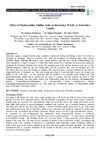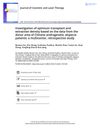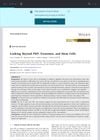
Search
for
Sort by
Research
390-420 / 582 results

research Efficacy and Safety Evaluations of Topical Proretinal Nanoparticles
Proretinal nanoparticles are a safe and effective way to deliver retinal to the skin.

research Effect of Madayantika Siddha Taila in Seborrhea Capitis
Madayantika Siddha Taila is effective for treating Seborrhea capitis.

research Role of Ayurvedic Management in Chemical Toxicity of Cosmetics: A Review
Ayurvedic methods can help reduce the harmful effects of chemicals in cosmetics.

research Identification of Neprilysin as a Potential Target of Arteannuin Using Computational Drug Repositioning
Arteannuin might work against cancer and Alzheimer's by targeting neprilysin.

research The Changing Face of Aesthetic Facial Plastic Surgery Among East Asians
More East Asians are accepting and getting facial plastic surgery, with a focus on natural-looking results and using both surgical and nonsurgical methods.

research Primary Scarring Alopecias: Review of Histopathological Findings of 37 Patients from the Department of Dermatology at the Hospital das Clínicas, Faculty of Medicine, University of São Paulo from 2000 to 2005
Accurate diagnosis of cicatricial alopecias requires thorough scalp examination and multiple biopsy techniques.

research Contact Allergic Dermatitis to Quinine in an Anti-Hair Loss Lotion
A woman was allergic to quinine in her anti-hair loss lotion.

research Dermatological Drugs and Topical Agents
Certain skin drugs and topical agents, including some natural extracts and fragrances, can cause allergic reactions. Some hair dyes and extensions, as well as minoxidil, a hair growth treatment, can also cause allergies. Botulinum toxin A can effectively reduce sweat but may have temporary side effects.

research Erbium YAG Laser in the Treatment of Androgenetic Alopecia
Erbium YAG laser treatment, combined with conventional therapy, can effectively reduce hair loss and promote hair growth in men with androgenetic alopecia.

research Identification of Key Genes and Signaling Pathways in Male Androgenetic Alopecia by Bioinformatics Analysis
Found key genes affecting hair loss, immune response, and skin development; more research needed for better treatments.

research Investigation of Optimum Transplant and Extraction Density Based on Data from the Donor Area of Chinese Androgenetic Alopecia Patients: A Multicenter, Retrospective Study
Optimal transplant density for Chinese male hair loss patients is 35-50 hair/cm², with minimum 106.88 hair/cm² left in donor area for esthetic satisfaction.

research Generation of an Integration-Free Human Induced Pluripotent Stem Cell Line MUSIi010-A from Occipital Scalp Fibroblasts of a Male Patient with Androgenetic Alopecia
Scientists created MUSIi010-A, a stem cell line from a balding man's scalp, to study hair loss and develop potential treatments.

research Clinical Trial and In Vitro Study Investigating Topical Application of Zataria Multiflora Boiss. and Matricaria Chamomilla Extracts for Androgenetic Alopecia
Extracts improve hair growth in alopecia.
research A Patient Guides Her Provider: A Dialogue Over Cultural Awareness
Cultural awareness in healthcare improves patient care and relationships.
research Identification of Novel Hair-Growth Inducers by Means of Connectivity Mapping
Fluphenazine and iloprost can induce hair growth.

research Topical Delivery of Drugs Using Ethosomes: A Review
Ethosomes improve drug delivery through the skin and show promise for treating male pattern baldness.

research How Our Microbiome Influences the Pathogenesis of Alopecia Areata
Our microbiome may affect the development of the hair loss condition Alopecia Areata, but more research is needed to understand this relationship.

research Looking Beyond PRP, Exosomes, and Stem Cells
Stem cells, PRP, and exosomes show promise in treating skin conditions but face regulatory and safety challenges.
research What's New in Pediatric Dermatology?
In 2017, pediatric dermatology advanced with new treatments and insights into various skin conditions in children.

research AP Collagen Peptides Improve Hair Growth and Quality by Promoting Human Hair Cell Proliferation and Keratin Synthesis
AP collagen peptides may help hair grow better and become stronger.
research 3 Alpha, 17 Beta-Androstanediol Glucuronide in Plasma: A Marker of Androgen Action in Idiopathic Hirsutism
High levels of 3 alpha-diol glucuronide in the blood are a marker of increased androgen action in women with excessive hair growth of unknown cause.
research Siddha Medicine: Background, Principles, and Application for Skin Diseases
Siddha medicine uses herbs and minerals to safely treat skin diseases like psoriasis and eczema.
research The Enzyme and Inhibitors of 4-Ene-3-Oxosteroid 5α-Oxidoreductase
Inhibitors of the enzyme 5 alpha-reductase could potentially treat disorders like prostate cancer and baldness.
research Herbs for Benign Prostatic Hyperplasia
Herbal treatments can help with early-stage BPH symptoms, but more research is needed.
research Maintenance, Withdrawal, and Re-Treatment with Ritlecitinib and Brepocitinib in Patients with Alopecia Areata in a Single-Blind Extension of a Phase 2a Randomized Clinical Trial
Continuous treatment with ritlecitinib and brepocitinib is needed to maintain hair regrowth in alopecia areata.
research Frontal Fibrosing Alopecia: Report of Three Pediatric Cases
Frontal fibrosing alopecia can occur in children, not just postmenopausal women.
research Safety of Skin Care Products During Pregnancy
Most skin care products are safe during pregnancy, but avoid hydroquinone and tretinoin.
research Endoscopic Brow Lift Fixation With Mitek Suture Anchors: A 9-Year Experience of a New Ideal Technique
The Mitek Microfix QuickAnchor is effective and safe for endoscopic brow lifts.
research Intoxication by Minoxidil, Active Ingredient of a Hair Lotion: A Case Report
Minoxidil ingestion can cause severe heart issues and requires careful medical monitoring.